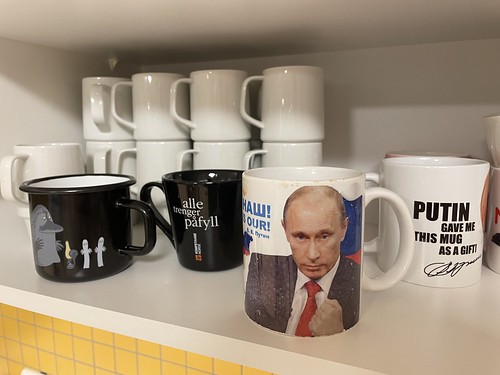‘Talkshow or a serious conversation?’ Tucker Carlson’s interview of Putin offered neither
Putin #Putin

“Are we having a talkshow or a serious conversation?” Vladimir Putin asked Tucker Carlson at the start of their interview on Thursday.
By the end of the two-hour conversation, the answer was clear: neither.
Instead, viewers got a lesson in Russian history, going all the way back to Prince Rurik – a Scandinavian who came and dished out a good kicking in the region in 862 – and taking in the reign of Yaroslav the Wise, the circa-1300 threat of the Grand Duchy of Lithuania and Russia going to war with Poland in the mid-1600s.
It wasn’t quite what Carlson fans, who are more accustomed to the big-faced, rightwing commentator attacking trans people and immigrants, would have been expecting. But for Putin, who hadn’t conducted an interview with western media in more than two years, it was an opportunity to make his extremely long-winded case that, historically, Russia and Ukraine are intertwined, and belong together.
“So that you don’t think that I’m inventing things, I’ll give you these documents,” Putin said early in the interview, after telling Carlson about how after Yaroslav the Wise died in 1054 the throne passed to Yaroslav’s brother, rather than his sons.
Putin beckoned to someone off camera and a lackey appeared with a binder containing letters written by Bohdan Khmelnytsky, who is not a household name in the US but is vaunted in Russia for telling the Poles to clear off in 1654.
The interview dragged on like this for about 40 minutes. It was not the veil-lifting insight into the region that Carlson had promised in a video message he released two days earlier.
English language “media outlets are corrupt – they lie to their readers and viewers”, Carlson said in that preview.
He said he was conducting the interview because: “Most Americans have no real idea what is happening in this region – here in Russia or 600 miles away in Ukraine. But they should know. They’re paying for much of it.”
Unfortunately, as Putin’s sally through Russian history approached the modern era – “In the early 80s, I went on a road trip in a car from then Leningrad, across the Soviet Union through Kyiv,” he told Carlson at one point, as the interview threatened to become an episode of This Is Your Life – it became clear that those Americans still have no idea what is going on in the area.
Viewers were, at least, getting a fresh insight into Putin’s personality, which on this evidence is basically that of a barroom bore who attends meetings at his local history club. And, eventually, the autocratic leader talked his way into the 21st century. He gave his version of a Russian-Ukraine conflict in which Russia is painted as an innocent party which hopes for peace.
Russia invaded Ukraine without provocation in February 2022, sparking a war which has killed or injured more than 300,000 of Putin’s own troops, likely killed more than 70,000 members of the Ukrainian military and, according to the UN, left 10,000 Ukrainian civilians dead.
But in Putin’s telling, the so-called “special military operation” was necessary to sort out corruption to conduct a “denazification” in Ukraine. According to the Russian president, he would have stopped the war by now were it not for “western countries” meddling in the peace process.
Boris Johnson, the disgraced former British prime minister, came in for particular ire. It was Johnson, Putin said, who dissuaded Volodymyr Zelenskiy, Ukraine’s president, from signing peace accords, instead “saying it was better to fight Russia”.
skip past newsletter promotion
Our US morning briefing breaks down the key stories of the day, telling you what’s happening and why it matters
Privacy Notice: Newsletters may contain info about charities, online ads, and content funded by outside parties. For more information see our Privacy Policy. We use Google reCaptcha to protect our website and the Google Privacy Policy and Terms of Service apply.
after newsletter promotion
For those watching who did not have a passion for Russian medieval history, there were some bits of interesting information.
Putin said Russia, despite the Kremlin previously saying peace talks were “unrealistic”, was in talks with the US about ending the conflict, although that came with an ultimatum to the White House.
“If you really want to stop fighting, you need to stop supplying weapons. It will be over within a few weeks,” he said.
There was an update, too, about Evan Gershkovich, the Wall Street Journal reporter who has been detained in Russia since 23 March having been accused of espionage – which Gershkovich and his employer deny.
Russia is “ready to talk” about releasing Gershkovich, Putin said, contradicting the White House, which said in December that Russia had rejected a substantial proposal for the release of the reporter and Paul Whelan, a former US marine serving a 16-year sentence in Russia on espionage charges.
As the interview passed the hour mark, there was some brighter news. Putin said he would not invade Latvia or Poland, saying the idea “goes against common sense”, and interest was piqued when Putin mused that, owing to the power of artificial intelligence, “it is now possible to create this superhuman, a specialized human being, a genetically engineered athlete, scientist, military man”.
As the two-hour slog drew to a close – “Thank you, Mr President,” Carlson cooed at the end – the real fascination was how Carlson had managed to bag an interview with one of the world’s most powerful leaders, at a time when Russia is engaged in a brutal conflict, and come up with … almost nothing.